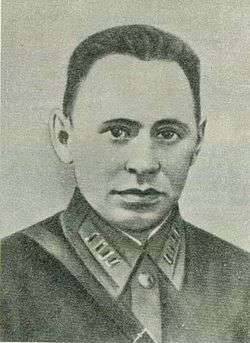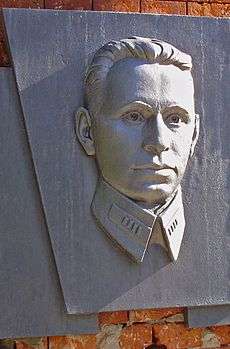Yefim Fomin
Yefim Moiseevich Fomin (Russian: Ефим Моисеевич Фомин), (15 January 1909 – 26 June 1941), was a Soviet political commissar. He is known for his part in the 1941 Defense of Brest Fortress, during which the German Army captured and immediately executed him.[1]
Yefim Moiseevich Fomin | |
|---|---|
 | |
| Born | January 15, 1909 |
| Died | June 26, 1941 (aged 32) |
| Nationality | Soviet Union |
| Occupation | Political commissar |
| Known for | Defense of Brest Fortress |
Fomin was born into a Jewish family in Kolyshki in Vitebsk Governorate (present-day Liozna Raion, Belarus) in 1909.[2] He lost his parents as a young boy and was raised in orphanages. In 1924, Fomin joined the Komsomol, at the age of 15. He worked at a shoe factory in Vitebsk and then moved to Pskov. There, he was sent to the Communist Party school to prepare for a career as a professional party worker. In 1930, at age of 21, while at the party school, Fomin became a member of the Soviet Communist Party. When he returned from the school, he was assigned to be a propagandist of the Pskov City Committee of the Communist Party.
Army career
In 1932 the Party assigned Fomin to the Soviet Army, where he became a political commissar and began a nomadic life of the military: Pskov - Crimea - Kharkiv - Moscow - Latvia.[3]
In August 1938, Fomin was designated as the divisional commissar of the 23rd (Kharkov) Rifle Division, in 1940, he served in Daugavpils, Latvia. However, in March 1941, he was demoted to a regimental commissar and assigned to the 84th Rifle Regiment of the 6th Rifle Division stationed in Brest, Belarus.[4]
On 21 June 1941, Fomin wanted to travel to Daugavpils to bring his family to Brest, but he failed to get a train ticket due to a big crowd of people at the railway station. On 22 June, Fomin was at the Brest Fortress, when the Wehrmacht started the war codenamed Operation Barbarossa. As the only higher commander present he took over the command of the group of Soviet soldiers that defended the Kholm Gate.
The battle for the fortress continued for several days. Fomin moved to the northern part of the fortress' Central island where he was captured on 26 June 1941.[5] Fomin was identified as a commissar and a Jew and due to the Commissar Order he was shot without delay, presumably, near the Kholm Gate.
Posthumous honours

In January 1957, Fomin was posthumously awarded the Order of Lenin for his role in the defense of the Brest Fortress. In May 1991, at a reunion of veterans of the 6th Rifle Division, Fomin's demotion to regimental commissar was posthumously revoked and he was restored to the rank of divisional commissar.[6]
References
- Kristian Gantser [Christian Ganzer], Irina Elenskaya, Elena Pashkovich, Evgenyy Rozenblat, Sergey Strunets (eds.): Brest. Leto 1941 goda. Dokumenty, materialy, fotografiy. Smolensk 2016, p. 638-639.
- "Surnames starting with the letter F". Russian Jewish Encyclopedia. JewishGen. Retrieved 2010-11-24.
- Pleshakov, Constantin (2005). Stalin's Folly: The Tragic First Ten Days of World War II on the Eastern Front. Houghton Mifflin Books. p. 243. ISBN 0-618-36701-2.
- Kristian Gantser [Christian Ganzer], Irina Elenskaya, Elena Pashkovich, Evgenyy Rozenblat, Sergey Strunets (eds.): Brest. Leto 1941 goda. Dokumenty, materialy, fotografiy. Smolensk 2016, p. 638-639.
- Kristian Gantser [Christian Ganzer], Irina Elenskaya, Elena Pashkovich, Evgenyy Rozenblat, Sergey Strunets (eds.): Brest. Leto 1941 goda. Dokumenty, materialy, fotografiy. Smolensk 2016, p. 638-639.
- Светлана Гладыш. Бессмертный гарнизон сражается.